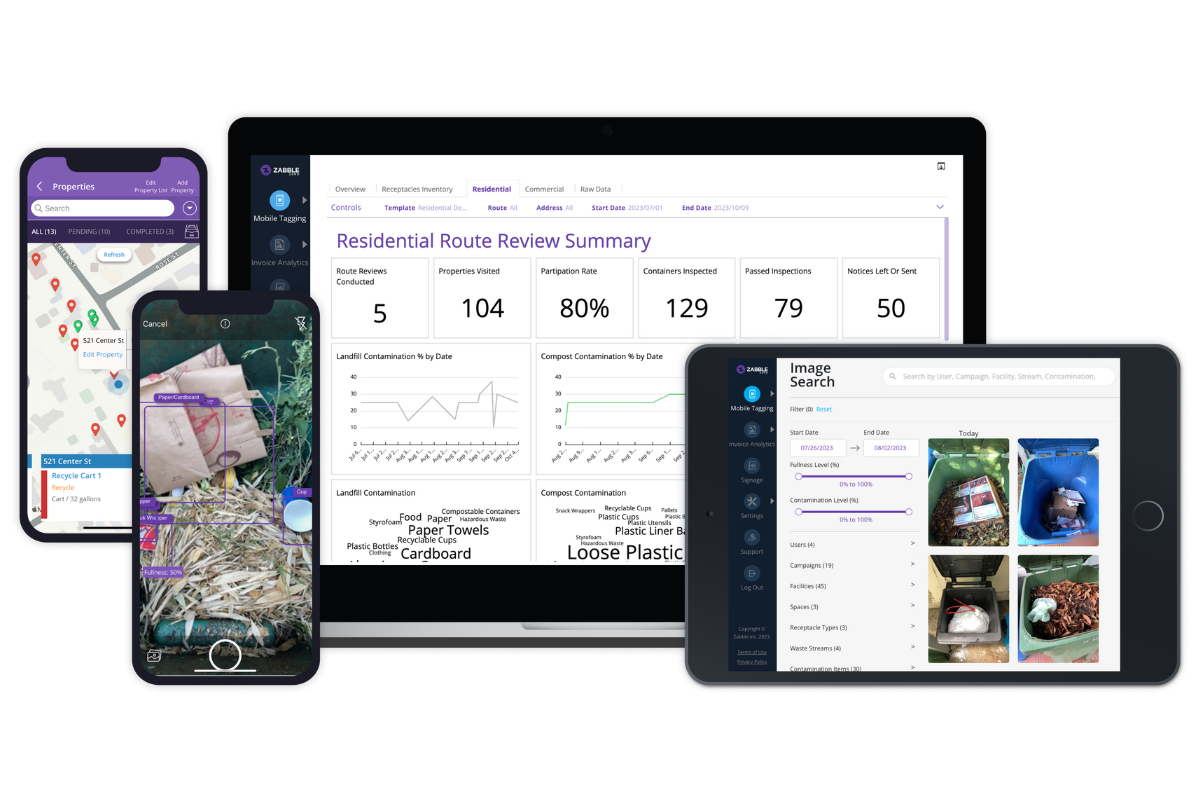
Now that California has mandated organics collection by local governments, Zabble hopes to see growing demand for its contamination monitoring tools. | Courtesy of Zabble
When Zabble interviewed dozens of municipal recycling stakeholders in California, one of the issues the company heard about was the inability to use contamination monitoring mobile device software in the field when there’s no network signal.
That outreach helped inform the latest rollout of Zabble’s software capabilities.
“The core focus on our design was robustness and how to make sure that they continue to drive those efficiencies even when there was no access to the internet,” said Nik Balachandran, CEO and founder of the small but growing company that’s centered in the San Francisco Bay Area.
Zabble, which has received funding from the U.S. EPA, is a data collection and analytics platform that allows recycling programs to track their recycling performance. Using AI-powered software, the company allows for real-time monitoring of recycling rates and contamination.
To date, universities have made up the bulk of Zabble’s clients, who pay a monthly subscription charge. But California’s implementation of Senate Bill 1383, which requires local governments to provide organics collection service to residents, “gave us an avenue” to roll out its offering to municipal recycling programs to collect granular data on organics diversion and contamination at the curb, Balachandran said.
The rollout of SB 1393 requires jurisdictions to conduct monitoring of their curbside organics collection stream. The California Department of Resources Recycling and Recovery (CalRecycle) recently announced it will provide a total of $90 million in local assistance grants to help jurisdictions comply with the organics mandates. For the first time, software such as Zabble’s constitutes an allowed expense under those grants, which are divided among local governments based on population, Balachandran said.
“The state has also kind of realized that technology could be really beneficial if it’s built properly,” he said.
EPA helps evolving the platform
Zabble has received multiple Small Business Innovation Research (SBIR) program grants from EPA. Last year, EPA gave Zabble a $400,000 SBIR grant to further develop its technology. In 2021, EPA provided Zabble an SBIR grant to help it first test its AI-powered visioning capabilities to automatically detect and categorize materials in the wrong bins using a cell phone image.
EPA funds helped pay for research that included outreach to 33 jurisdictions, six consulting organizations and seven haulers earlier this year. That outreach helped inform the development and rollout of Zabble’s latest software offering, called “Mobile Tagging for Jurisdictions,” which is aimed at helping local governments comply with the state requirements that they monitor their organics programs.
The mobile device software is designed to automatically detect cart fill and contamination levels, simultaneously linking the data to the address, all without having a network connection (in areas without good cell signal, many cart auditors use a pen and paper as a backup, Zabble’s outreach found).
The software system then helps jurisdictions analyze their results and determine how to best address contamination with the households. Balachandran noted jurisdictions can take advantage of the no-code app development, essentially allowing program staff without coding knowledge to drag-and-drop to build an app with data fields they’ll find most useful.
Growth opportunities abound
CalRecycle data indicates roughly 75% of jurisdictions in the state now have residential organics collection in place. That means the majority are now shifting into the monitoring phase.
A handful of municipalities are currently using Zabble’s software when they flip lids. Those include the city of Berkeley, the Castro Valley Sanitary District and two others that Balachandran declined to identify.
Zabble is working with them to determine how many organics carts they need to sample to produce representative data on systemwide contamination levels, so they don’t end up under- or oversampling.
“With Zabble’s AI-powered technology, we’re partnering to uncover efficiencies with lid flips, unlock valuable time and resources and gain granular contamination insights to improve our programs,” Julia Heath, recycling program manager at the city of Berkeley, stated in a press release. “This enables us to channel more of our efforts toward reducing our environmental footprint and building a sustainable future for our city and county.”
Zabble, itself, is a growing company. After enjoying steady two- or three-times annual revenue growth in recent years, the company is now roughly breaking even, Balachandran said. Employing a mix of full-time employees and contractors, Zabble has a fully remote, fully U.S. based workforce, Balachandran said.